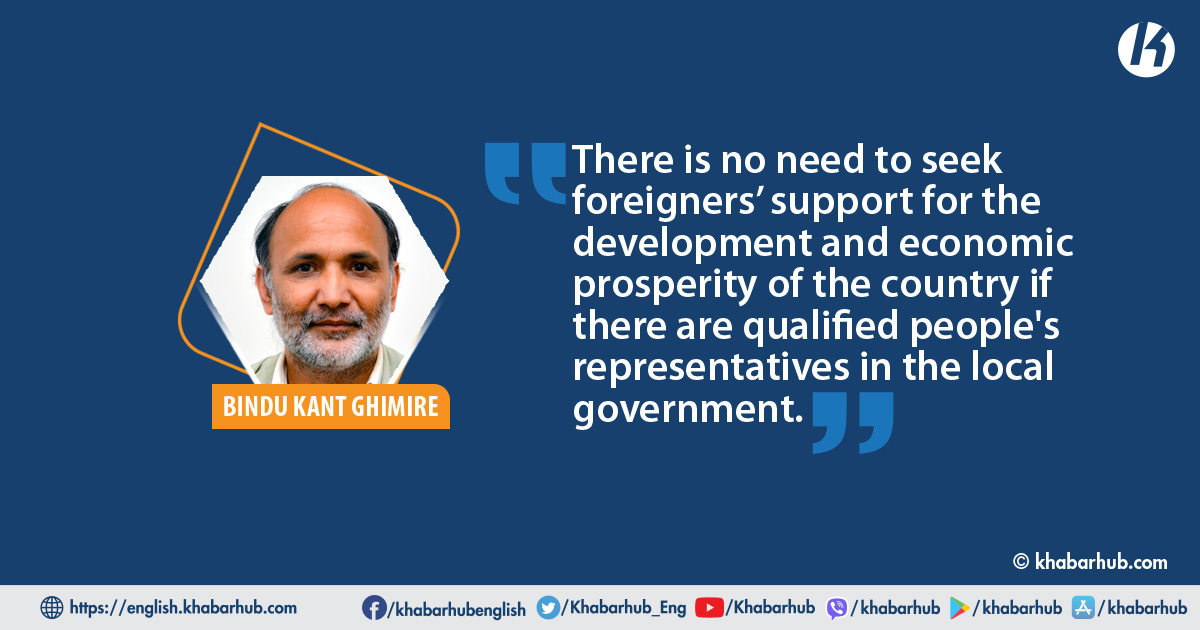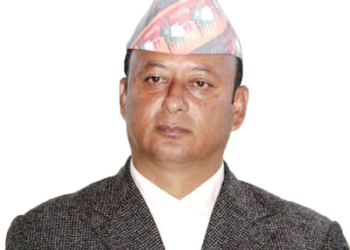The number of students applying for admission in Melamchi Ghyang Secondary School in Sindhupalchok district this year exceeded four times more than the total number of seats.
According to Nima Galgen Sherpa, chairperson of the rural municipality, students from Kathmandu, Pokhara and Ilam applied to study at the school. Interestingly, this was the same school, which struggled to admit students just five years ago.
Sherpa said the education in this school was already good, but the attraction of Melamchi Ghyang Secondary School in the foothills of the Himalayas increased after the village municipality took to publicizing that the school had an excellent teaching method.
Preparations to make Helambu village an ‘educational hub’ of the country have reached the final stage by establishing another school at Melamchi Ghyang School after increasing the pressure of students from all over the country.
Similarly, the Helambu region has also made great strides in tourism. At this time, the tourism business of other places has slowed down, but the tourists visiting Helambu have to book a hotel a year in advance.
The main reason for the influx of internal and external tourists in Helambu is the Himalayan Great Trail footpath constructed by the village municipality.
The Himalayan Great Trail footpath, which has been started in Helambu to give a glimpse of the Great Wall of China, is the vision of Sherpa, the village chairman.
The construction of the Himalayan Great Trail footpath, which is targeted to be about 50 kilometers long, has been completed in about five kilometers during this period.
It is more attractive for trekking and natural scenery than the Great Wall of China.
Similarly, the number of tourists visiting Bharat Lake in Sarlahi, which was completed only a year ago, has exceeded five lakh.
It is the largest reservoir in Nepal. According to Bagmati Village Municipality Chairman Bharat Kumar Thapa, the lake has been constructed using about 200 bighas of barren land. That is why everyone calls this lake Bharat Taal.
About 1,500 locals have found employment due to the construction of Bharat Lake for Rs. 370 million.
Water sources have started bursting in the dried-up dug wells and rower-pumps of the settlements around the lake and the fertility of the surrounding land has started increasing. Birds and wildlife are also having a positive impact on the environment.
It is natural for the people to fear that the governance system of the country is bad when some municipalities are misusing the budget for the construction of view towers on the hilltops, destruction of nature in the name of development, pocketing the development budget and adding tax burden on the people.
The internal revenue of Simraungadh municipality of Bara district, which is connected to the Indian border, was Rs. 2.1 million five years ago. But at present, the municipality is collecting Rs. 90 million annually by renting public ponds for fish farming.
Most of the fish in the Simraungadh area are sold in India at very good prices. From the vegetable market opened by Simraungadh Municipality, 6-7 trucks of vegetables reach Kathmandu daily.
Up to five years ago, a couple of tourists used to visit the ruins of the palace of the Malla kings at Simrautgarh, but now the tourists are crowded.
Chief of the municipality, Bijay Shankar Yadav, says, “During this period of five years, we have been able to construct paved roads. We have already provided drinking water.”
Helambu village in the Himalayan region, Bagmati municipality in the Chure region, and Simraungadh municipality in the Indian border region are mentioned only as examples.
These three municipalities are presented as examples not only for geographical reasons but also for social reasons.
Nepal is like a trinity of the Janajati community, Khas Arya community and Madhesi community. Given this opportunity, it is clear that the leaders of these three communities are no less than well-known foreign development experts.
Neither the chairman of Helmu village Sherpa has obtained a degree from any foreign university, nor the head of Simraungadh municipality Yadav.
Thapa, the chairman of Bagmati village municipality, too, has not taken a degree in prosperity from any foreign university.
But with their sincerity and diligence, the leaders of these three separate communities in these three separate geographies have paved the way for economic prosperity for the country in five years.
The number of municipalities doing such exemplary work is remarkable in Nepal.
But there was a lot of talk about the municipalities, which could not perform well and some which showed good results but were overshadowed due to which people have started pointing fingers at the federal system of governance.
It is natural for the people to fear that the governance system of the country is bad when some municipalities are misusing the budget for the construction of view towers on the hilltops, destruction of nature in the name of development, pocketing the development budget and adding tax burden on the people.
There is no need to look to foreigners for the development and economic prosperity of the country if there are qualified people’s representatives in the local government.
A study has also shown that one-third of the 753 municipalities have shown such an example.
Is the federal system of governance bad or the fault of character and tendency due to the inability of infrastructure development and economic prosperity to pick up speed? The matter has become very complicated.
For example, recently it was reported that the ward chairperson of Chandragiri Municipality Ward No. 2 of Kathmandu with the help of a mob vandalized the residence and office of a Japanese contractor and employee of Nagdhunga Tunnel Road.
Construction of the tunnel has stalled since that day. It has been reported that a ward chairperson of Surkhet district was arrested with a stolen motorcycle last Wednesday.
It is also learned that a ward chairperson of Sankhuwasabha has brought 29 ropanis of the land of a single woman from his village in his name. He is currently in jail.
The number of people who get the post from the ticket given by the party with confidence and the vote given by the people with confidence and commit many crimes in the name of the same post is significant in the country.
If people with this tendency continue to get tickets and win elections, not only the system of governance but also the country itself will go into the abyss.
Instead of winning the election, the big parties should show sincerity in not giving tickets to such people under any circumstances.
However, some local organizations of the big parties have already come under the control of such people.
The question is whether the top leaders of the big parties have fallen into the clutches of the suspects.
Voters have been blamed for electing the wrong person. But most of the voters in our country are not organized.
Most of the voters have not got the opportunity to be aware. However, the parties are organized. The party cadres are organized.
Businessmen doing black businesses who can buy party tickets are also organized. It is up to the party leadership to bring discretion in such matters. Multi-party democracy is envisaged to ensure that the wrong person wins the election by the mafia.
A multi-party system is needed to prevent the wrong person from being elected.
However, a study has shown that the wrong people were elected in about one-third of the municipalities in the last local elections.









Comment